Ken Loach, a social activist filmmaker
- Fiche de cours
- Quiz et exercices
- Vidéos et podcasts
Découvrir un aspect de la notion « Art et pouvoir ».
- Ken Loach est un réalisateur engagé, au point que l’on peut parler de militantisme politique.
- Les thèmes principaux abordés par Ken
Loach dans ses films sont :
- la pauvreté,
- les problèmes rencontrés par les minorités,
- les droits des migrants.
- Ses films sont caractérisés par un fort réalisme social. Il utilise sa caméra comme une arme pour dénoncer les problèmes de nos sociétés.
- Connaitre les classes sociales en Angleterre
- Connaitre les injustices sociales dans le monde
Kenneth Loach was born on June 17, 1936, in Warwickshire, in the West Midlands. It is the county where Shakespeare was also born. His parents belonged to the lower middle class, a class he has always defended in his movies. After studying law at Oxford and two years in the Royal Air Force, he started a career in the dramatic arts and worked first as an actor, before becoming a director for the BBC.
His first works were docudramas but he soon decided to direct films for the cinema. He has directed 27 films so far, 30 TV plays and 6 documentaries. He received a lot of awards and he is the most prestigious film director of the Festival de Cannes. He won the Palme d’Or twice, in 2006 (The Wind that Shakes the Barley) and in 2016 (I, Daniel Blake).

Ken Loach
Apart from his brilliant career as a filmmaker, Ken Loach is known for his political commitment. As early as the 1960s, Ken Loach joined the Labour Party, supported the Trade Unionist and Socialist Coalition in 2012 and campaigned for a new left-wing party in 2013. In 2016, he realised a documentary, In Conversation with Jeremy Corbyn, leader of the Labour Party.
Since 2009, he has condemned the positions of the Israeli government, refused funds and supported boycotts to protest against their policy towards Palestine.
The Trade Unionist and Socialist Coalition is a left to far-left wing alliance which was created in 2010 for the general election.
As an activist, Loach denounces the dilemmas that all kinds of minorities suffer from. In the 1960s, he attacked the problem of homelessness (Cathy Come Home) and poverty (Poor Cow). Poverty is a recurrent theme in Loach’s filmography. In 1993, Raining Stones will express how difficult it is for an unemployed man to buy a communion dress for his daughter.
Like him, his heroes can be activists as in It’s a Free World where a woman defends the rights of migrants, but they are often depicted like ordinary people affected by alcohol (My Name is Joe) or depression (Looking for Eric) though they cannot be blamed for the wrongs which gnaw at them. Indeed, they are moving characters and the audience has pity on them.
Inter-racial love affairs (Just a Kiss) or relationships between teenagers and parents (Sweet Sixteen) also appear in Loach’s films.
But Ken Loach does not only explore what is taking place in his own country, he also makes us discover the political, social or historical situation of foreign countries too, present or past.
In the 1990s, Hidden Agenda dealt with the Troubles in Northern Ireland; Land and Freedom was about the Republican resistance during the Spanish Civil War; and Carla’s Song explained what the situation was like in Nicaragua. In 2000, Bread and Roses was centered on a strike organized by janitors in Los Angeles.
In 2006 The Wind that Shakes the Barley focused on the Irish War of Independence and the subsequent Civil War in the 1920s; and in 2010, Route Irish evoked the difficulties met by former British soldiers after fighting in the Iraq war.
Here are some other films that are worth seeing: Kes, Riff-Raff, The Navigators, The Angels’ Share, etc.
As we have seen Ken Loach, whose films are marked with social realism, feels deeply concerned with the problems of our world and he uses his camera as a weapon to fight them, trying his very best to annihilate them. He is one of the greatest film producers and though he is 83 we can expect that he will continue making films until his last breath. To our delight!
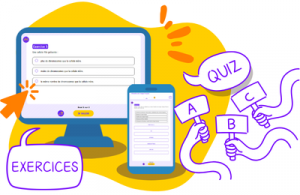
Des quiz et exercices pour mieux assimiler sa leçon
La plateforme de soutien scolaire en ligne myMaxicours propose des quiz et exercices en accompagnement de chaque fiche de cours. Les exercices permettent de vérifier si la leçon est bien comprise ou s’il reste encore des notions à revoir.
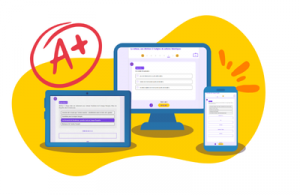
Des exercices variés pour ne pas s’ennuyer
Les exercices se déclinent sous toutes leurs formes sur myMaxicours ! Selon la matière et la classe étudiées, retrouvez des dictées, des mots à relier ou encore des phrases à compléter, mais aussi des textes à trous et bien d’autres formats !
Dans les classes de primaire, l’accent est mis sur des exercices illustrés très ludiques pour motiver les plus jeunes.
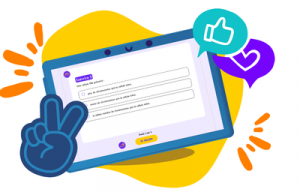
Des quiz pour une évaluation en direct
Les quiz et exercices permettent d’avoir un retour immédiat sur la bonne compréhension du cours. Une fois toutes les réponses communiquées, le résultat s’affiche à l’écran et permet à l’élève de se situer immédiatement.
myMaxicours offre des solutions efficaces de révision grâce aux fiches de cours et aux exercices associés. L’élève se rassure pour le prochain examen en testant ses connaissances au préalable.
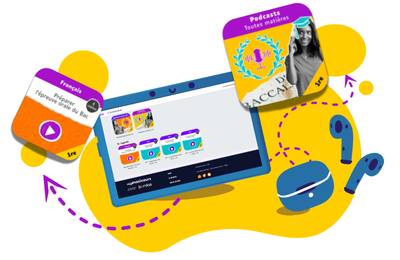
Des vidéos et des podcasts pour apprendre différemment
Certains élèves ont une mémoire visuelle quand d’autres ont plutôt une mémoire auditive. myMaxicours s’adapte à tous les enfants et adolescents pour leur proposer un apprentissage serein et efficace.
Découvrez de nombreuses vidéos et podcasts en complément des fiches de cours et des exercices pour une année scolaire au top !
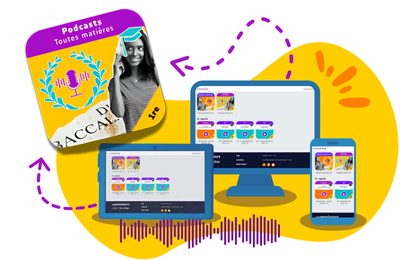
Des podcasts pour les révisions
La plateforme de soutien scolaire en ligne myMaxicours propose des podcasts de révision pour toutes les classes à examen : troisième, première et terminale.
Les ados peuvent écouter les différents cours afin de mieux les mémoriser en préparation de leurs examens. Des fiches de cours de différentes matières sont disponibles en podcasts ainsi qu’une préparation au grand oral avec de nombreux conseils pratiques.
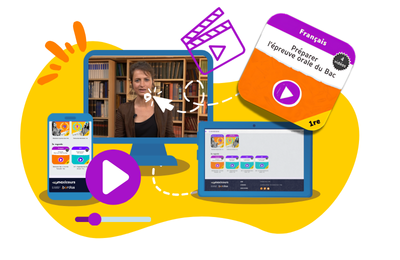
Des vidéos de cours pour comprendre en image
Des vidéos de cours illustrent les notions principales à retenir et complètent les fiches de cours. De quoi réviser sa prochaine évaluation ou son prochain examen en toute confiance !









